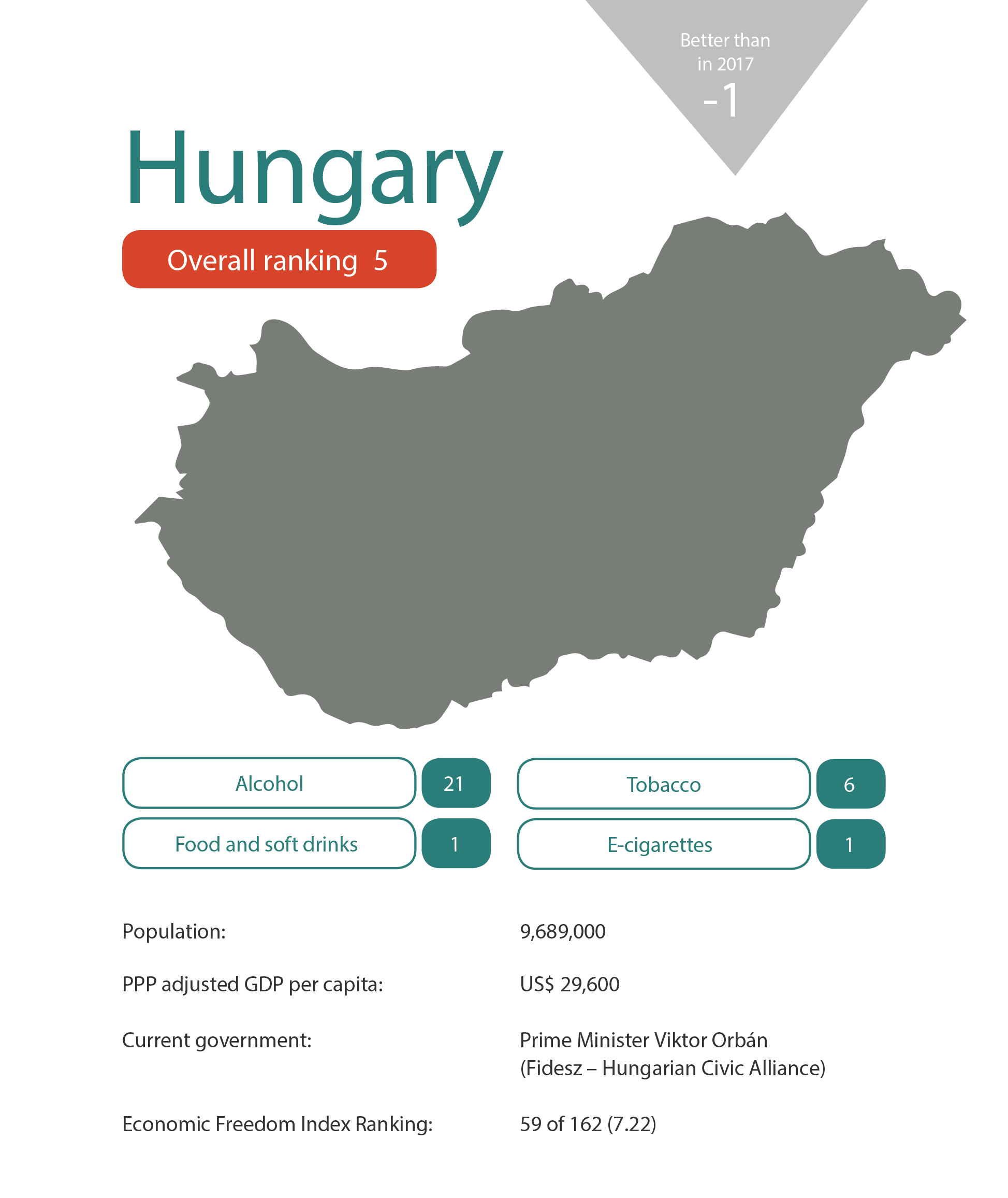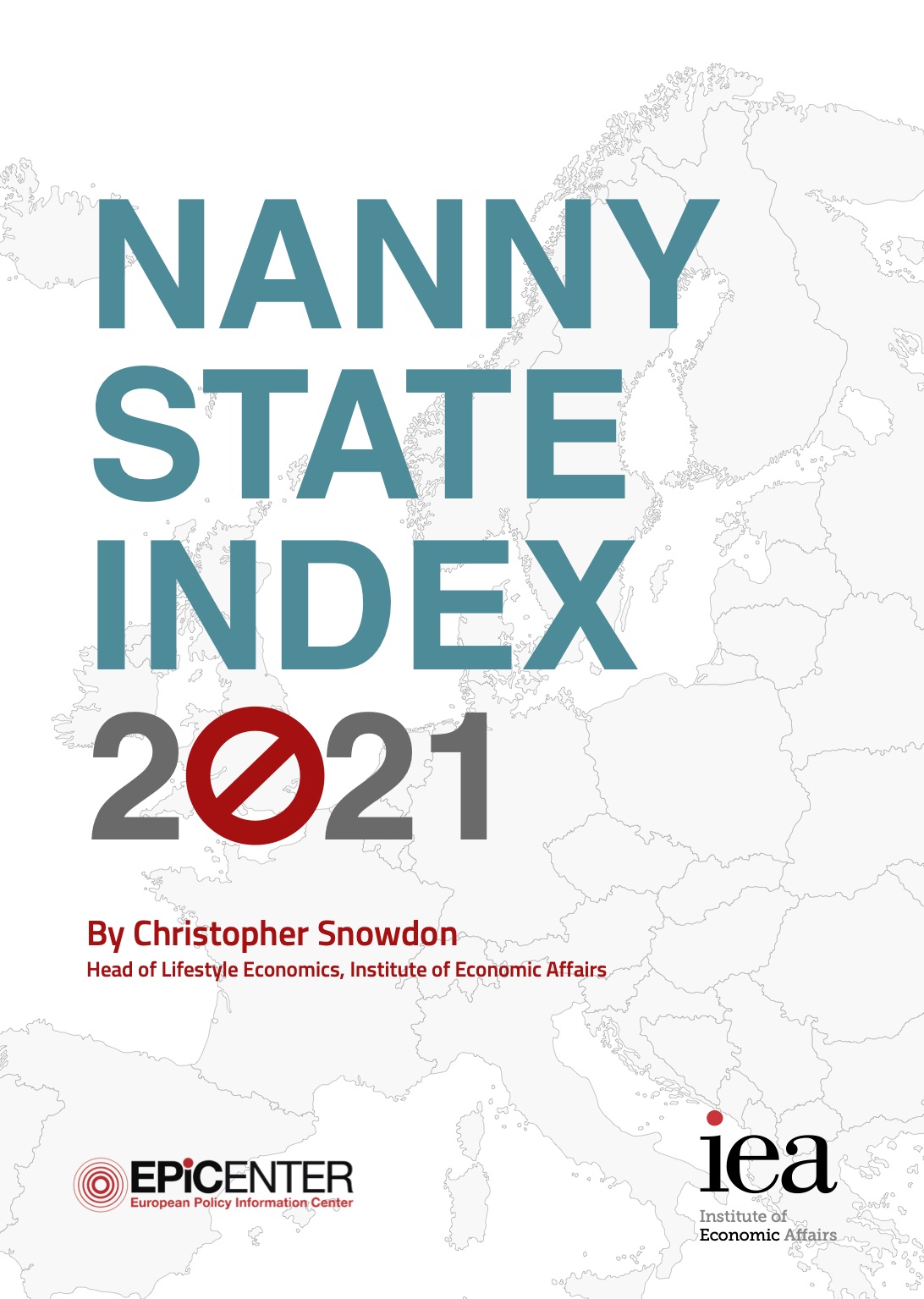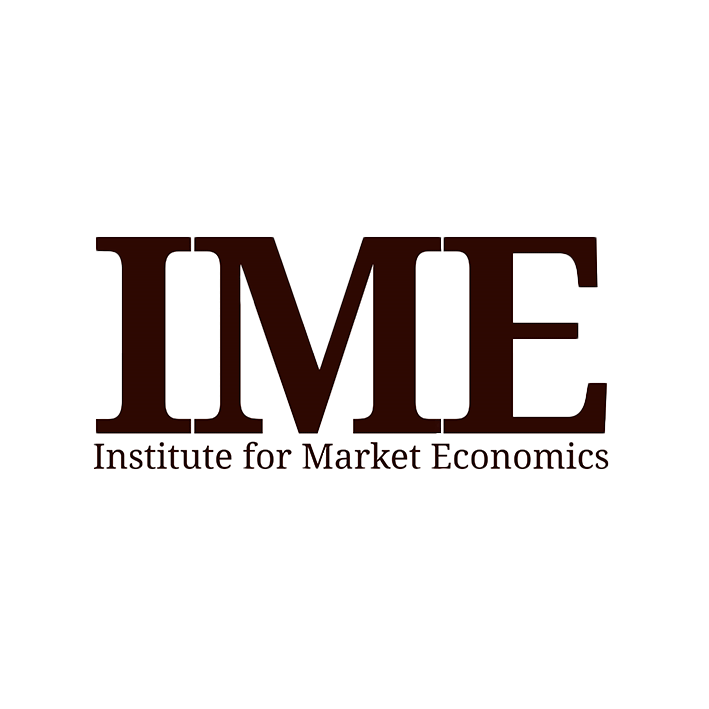
Under the authoritarian government of Viktor Orbán, Hungary has introduced some of the most intrusive ‘public health’ policies on food, tobacco and e-cigarettes in Europe. It has an extensive system of food and soft drink taxes, a full ban on smoking indoors and a tax on e-cigarette fluid. Hungary is at the top of both the food/soft drink league table and the e-cigarette league table. If it had Scandinavian levels of alcohol taxation it would be a strong contender for the number one spot in the Nanny State Index, but neither its beer tax nor its spirits duty is particularly high and there is no duty tax on wine.
The Public Health Product Tax (commonly known as the ‘chips tax’) was introduced in September 2011 and levies sin taxes on a host of foods that are deemed to be high in salt, sugar and/or caffeine. The rates were increased by 20 per cent in January 2019 and include: sweets – 160 Forints (€0.50) per kilogram, soft drinks – 15 Forints (€0.05) per litre, energy drinks – 300 Forints (€0.93) per litre, condiments – 300 Forints (€0.93) per kilogram, jam – 600 Forints (€1.87) per kilogram, salty snacks – 300 Forints (€0.93) per kilogram. There are legal limits on the amount of trans-fats that food can contain and limits on the amount of salt that can be put into bread (a maximum of 1.57 grams of salt per 100 grams of bread).
Hungary’s health minister, János Lázár, wishes to ultimately prohibit smoking by stopping anybody born after 2020 from ever buying tobacco. He has also expressed a desire to ban smoking in all cars even if there is nobody in it but the smoker. Tobacco is heavily regulated with a vending machine ban and a ban on retailers displaying tobacco products in a manner that makes them visible from outside the shop. Since May 2018, all newly manufactured tobacco products must be in ‘standardised’ packaging and it will be illegal to sell a conventional, branded pack of cigarettes to the public from 31st December 2021.
There is a zero-exemption ban on smoking in bars, restaurants and workplaces, and smoking is even banned in some outdoor areas. Tobacco retailing is a state monopoly, with licences allegedly handed out to party loyalists. Since May 2016, these shops have also had a monopoly on selling e-cigarettes. It has been reported that the government plans to turn the alcohol retail business into a similar state monopoly.
Until 2016, nicotine-containing e-cigarette fluid was effectively prohibited but it has since been legalised as a consumer product. A tax of 65 Hungarian Forints (€0.20) per ml was introduced on January 1st 2017 and was due to rise to 70 Forints in July 2017 but the government backtracked and reduced it to 55 Forints (€0.17). E-cigarette advertising is banned and vaping is prohibited wherever smoking is prohibited unless the vaping device was prescribed by a doctor (which is most unlikely). Cross-border sales are banned and all e-cigarette flavours apart from ‘tobacco flavour’ are prohibited.
With thanks to the Hungarian Free Market Foundation
About
The Nanny State Index (NSI) is a league table of the worst places in Europe to eat, drink, smoke and vape. The initiative was launched in March 2016 and was a media hit right across Europe. It is masterminded and led by IEA’s Christopher Snowdon with partners from all over Europe.
Enquiries: info@epicenternetwork.eu
Download Publication

Previous version: 2019
Categories
About the Editor
Christopher Snowdon is the head of Lifestyle Economics at the Institute of Economic Affairs. His research focuses on lifestyle freedoms, prohibition and policy-based evidence. He is a regular contributor to the Spectator, Telegraph and Spiked and often appears on TV and radio discussing social and economic issues.
Snowdon’s work encompasses a diverse range of topics including ‘sin taxes’, state funding of charities, happiness economics, ‘public health’ regulation, gambling and the black market. Recent publications include ‘Drinking, Fast and Slow’, ‘The Proof of the Pudding: Denmark’s Fat Tax Fiasco’, ‘A Safer Bet’, and ‘You Had One Job’. He is also the author of ‘Killjoys’ (2017), ‘Selfishness, Greed and Capitalism’ (2015), ‘The Art of Suppression’ (2011), ‘The Spirit Level Delusion’ (2010), ‘Velvet Glove, Iron Fist’ (2009).
Hungary 2019

Under the authoritarian government of Viktor Orbán, Hungary has introduced some of the most intrusive ‘public health’ policies on food, tobacco and e-cigarettes in Europe. It has an extensive system of food and soft drink taxes, a full ban on smoking indoors and a tax on e-cigarette fluid. Hungary is at the top of both the food/soft drink league table and the e-cigarette league table. If it had Scandinavian levels of alcohol taxation it would be a strong contender for the number one spot in the Nanny State Index, but neither its beer tax nor its spirits duty is particularly high and there is no duty tax on wine.
The Public Health Product Tax (commonly known as the ‘chips tax’) was introduced in September 2011 and levies sin taxes on a host of foods that are deemed to be high in salt, sugar and/or caffeine. The rates were increased by 20 per cent in January 2019 and include: sweets – 160 Forints (€0.50) per kilogram, soft drinks – 15 Forints (€0.05) per litre, energy drinks – 300 Forints (€0.93) per litre, condiments – 300 Forints (€0.93) per kilogram, jam – 600 Forints (€1.87) per kilogram, salty snacks – 300 Forints (€0.93) per kilogram. There are legal limits on the amount of trans-fats that food can contain and limits on the amount of salt that can be put into bread (a maximum of 1.57 grams of salt per 100 grams of bread).
Hungary’s health minister, János Lázár, wishes to ultimately prohibit smoking by stopping anybody born after 2020 from ever buying tobacco. He has also expressed a desire to ban smoking in all cars even if there is nobody in it but the smoker. Tobacco is heavily regulated with a vending machine ban and a ban on retailers displaying tobacco products in a manner that makes them visible from outside the shop. Since May 2018, all newly manufactured tobacco products must be in ‘standardised’ packaging and it will be illegal to sell a conventional, branded pack of cigarettes to the public from 31st December 2021.
There is a zero-exemption ban on smoking in bars, restaurants and workplaces, and smoking is even banned in some outdoor areas. Tobacco retailing is a state monopoly, with licences allegedly handed out to party loyalists. Since May 2016, these shops have also had a monopoly on selling e-cigarettes. It has been reported that the government plans to turn the alcohol retail business into a similar state monopoly.
Until 2016, nicotine-containing e-cigarette fluid was effectively prohibited but it has since been legalised as a consumer product. A tax of 65 Hungarian Forints (€0.20) per ml was introduced on January 1st 2017 and was due to rise to 70 Forints in July 2017 but the government backtracked and reduced it to 55 Forints (€0.17). E-cigarette advertising is banned and vaping is prohibited wherever smoking is prohibited unless the vaping device was prescribed by a doctor (which is most unlikely). Cross-border sales are banned and all e-cigarette flavours apart from ‘tobacco flavour’ are prohibited.
With thanks to the Hungarian Free Market Foundation

 Austria
Austria Belgium
Belgium Bulgaria
Bulgaria Croatia
Croatia Cyprus
Cyprus Czech Republic
Czech Republic Denmark
Denmark Estonia
Estonia Finland
Finland France
France Germany
Germany Greece
Greece Hungary
Hungary Ireland
Ireland Italy
Italy Latvia
Latvia Lithuania
Lithuania Luxembourg
Luxembourg Malta
Malta Netherlands
Netherlands Norway
Norway Poland
Poland Portugal
Portugal Romania
Romania Slovakia
Slovakia Slovenia
Slovenia Spain
Spain Sweden
Sweden Turkey
Turkey United Kingdom
United Kingdom


















